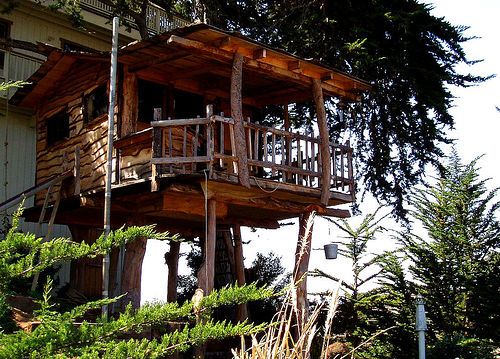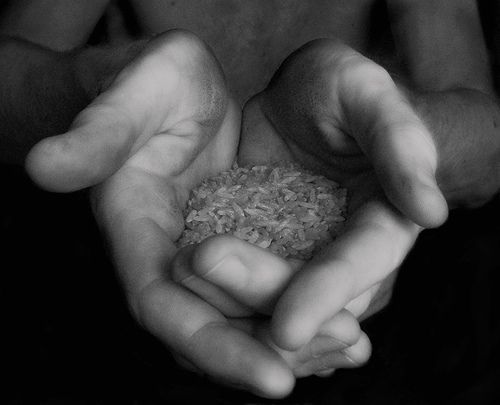The past few weeks we explored the basics of Dave Ramsey‘s baby steps — save up $1,000 and pay off debt, then save up a fully-funded Emergency Fund and start investing for the future.
Today, we’re exploring the last two steps — paying off your house, building wealth, and giving like crazy. And I can’t wait to actually be at these steps.
As a reminder, here are all seven baby steps:
1. Quickly save $1,000 as your beginning Emergency Fund.
2. Pay off all your non-mortgage debt using the Debt Snowball method.
3. Save 3 to 6 months of expenses, completing the Emergency Fund from step 1.
4. Invest 15% of your regular household income for retirement.
5. Create a college fund for your children.
6. Pay off your house.
7. Build wealth and give like crazy.
And like I reminded you the past few weeks, Dave’s plan isn’t the only plan, but it’s a great one that makes a lot of sense, and has worked beautifully for my family.
And also, even though “give like crazy” isn’t until step 7, he still advocates charitable giving all throughout the plan. The last step implies having enough wealth that you can give tons of it away and still live comfortably.
Baby Step 6
After you start investing for retirement and your children’s future education, you put all your efforts towards paying off your house. This step is controversial because popular advice tells you to keep your mortgage forever and ever for the tax write-off.
This popular argument is rather silly, really. To save giving money to the government (taxes), you’re going to continue giving money to the bank (interest). Over time, you’ll pay more in interest than you would save in tax write-offs.
A simple solution is that once you have no mortgage, take the same amount you’d pay in a mortgage interest, and give it to charity instead. You’ll get the same write-off. And you get to put that money towards something you care about, instead of to the government.

Benefits of a Paid-For House
There are a plethora of benefits to having a home you truly, 100 percent own. Here are just a few:
1. You’ve got less risk.
Once your securely in a paid-off home, you can rest assuredly that nothing can happen to your home, no matter the economy, your job situation, or life stage. It’s nothing but equity.
2. You’ll have less stress and more peace.
Don’t underestimate the emotions behind personal finance. Having a paid-for house means not worrying about a mortgage payment, and it means enjoying the four walls you truly own. As Dave says, the grass in your yard feels different when you own it.
3. More money for other things.
The money you were paying towards a mortgage? Now you can really fund that retirement account, easily save up for a vacation, or add an addition or remodel that paid-for house in 100 percent cash.
“Negatives” to Paying off Your House Early
I’m not too subtle in how I feel about this, eh? But there are some arguments people make for not paying your home off early. Here are a few:
1. Your investments aren’t as diverse.
When you funnel your money towards paying off your house, you’re not investing extra towards retirement or college education. It’s in one major thing — your home.
But I argue that your investments are diverse here, because baby steps 4 and 5 are to save up for retirement and kids’ education. So you’re not doing nothing there — in fact, by adding a paid-for house to your portfolio, I’d say you’re more diverse! And once you have no mortgage payment, you’ll have plenty of money to invest elsewhere.
2. Your funds aren’t as liquid.
Some argue that in a paid-for house, you can’t easily access extra money when you need it; that if more is in mutual funds, you’d be able to grab it in a hurry. But I argue that this is exactly why baby step 3 is to save six month’s worth of expenses — for emergencies. You can easily grab that money out of a savings account.
3. You’re working against inflation.
One argument against paying off your home early is that you’re working against inflation — as it rises three to four percent annually, you’re essentially paying “less” each year for your home. In other words, your $1,000 monthly mortgage payment is worth less each year.
But seriously — if you paid off your home early, you can transfer that steady mortgage payment into a monthly investment. And if your retirement and education accounts are in something steady like mutual funds, they can often offer a seven to twelve percent return. That definitely makes your $1,000 a month more powerful.
To sum up, baby step 6 is to put your efforts towards paying off your mortgage as fast as you can. And if you can’t tell, I’m all for it.
There really is a method to these baby steps here — and there’s a reason paying off the house is one of the last steps. It’s so all these other things are set in place, like an emergency fund and other investments for the future. This makes it a blessing to truly own your home without worry.
For even more inspiration, follow Crystal’s story on Money Saving Mom about how her family recently saved up 100 percent for their first home.
Baby Step 7

The last baby step is to build wealth and give like crazy. Now that your home is paid off, you are truly free to do what you want with the money you earn. For one thing, you don’t need to earn as much, so if you want to downgrade to a less stressful job, you can. Or, you can take your money and let it work for you.
As you invest your money, you build wealth. There’s even a tipping point, where eventually, your invested money makes more than you do — and that’s when wealth-building goes into overdrive. You can quickly save up for a nice vacation, because you’ve got enough “extra” money. You can get that thing you’ve always wanted. Your money officially works for you.
Here’s a recent quote Dave had with a caller to his radio show:
When you don’t have a house payment and you make $90,000, if you go blow $2,000 or $3,000 on something in a given month, it doesn’t matter. If you blow $5,000 on an Aspen trip and it took you four months to save up for that, whoopee! You can do that then, because it doesn’t affect your net worth and it doesn’t put you in debt. It doesn’t cripple your family’s future. That’s when you know you can live like no one else.
A friend of mine felt guilty the other day because he bought a new Lexus. He has $20 million. My response to him was, “Dude, would you please shut up? You buying that Lexus is like most people buying a Happy Meal.” It doesn’t matter. He can do that and still hand someone a $100,000 check for Haiti.
And this is what I truly love about Dave — he really emphasizes giving. I can’t say this from experience, but Dave has said that after awhile, lobster tastes like soap. He means that you can think of all these things you’d like once you’re in wealth-building mode, but once you’ve tried it, it’s no big deal. The real blessings — and the real fun — are when you can give like crazy.
Yes, you should be giving a portion of your income to charity throughout all the steps. But in step 7, you can do really wild things.
• You can drop a $100 tip on a waitress that does a great job and you can tell could really use it.
• You can anonymously leave cash for a single mother, who has no money for groceries.
• You can fund a major project headed by a relief or missions organization.
• You could help support several missionary families, or pay for girls’ education in a difficult country, or provide aid to orphans.
• You could drop a ton of money on relief efforts, such as those happening in Haiti.
These are the things that get me really jazzed up. And this is what my family is working towards. Now that we’re on baby steps 3b/c/d, 4, and 5 all at the same time, we have a specific plan. We’re saving up to eventually build our own home — a small one on a pretty plot of land. As we invest in retirement and our kids’ education, we’ll channel all our money and energy on paying off that house as quickly as we can. And then we can start building wealth.
What are your family’s big dreams?


